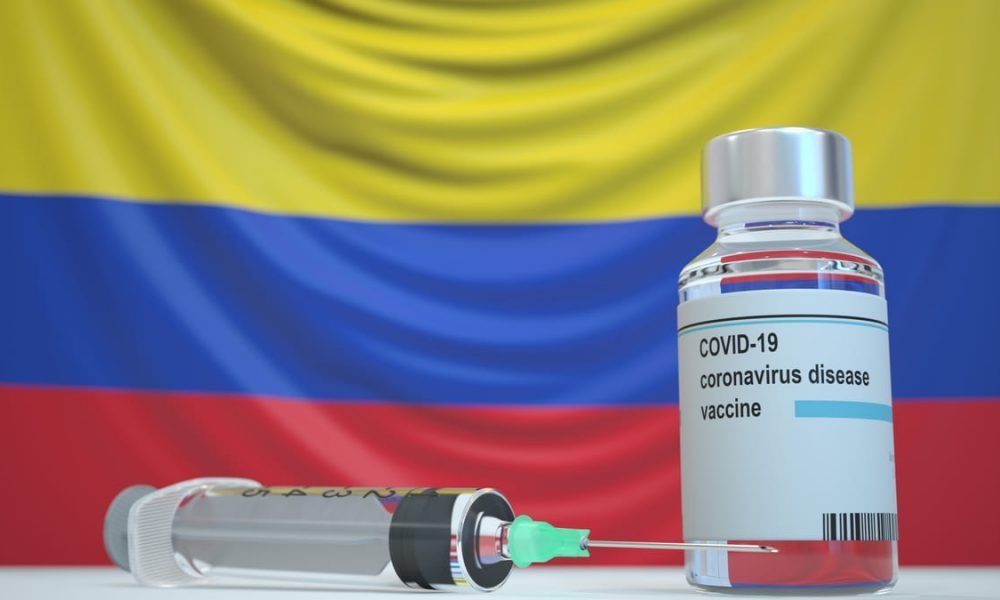RIO DE JANEIRO, BRAZIL – With the lowest numbers of deaths and infections in four months, Colombia begins to leave behind the third peak of the Covid-19 pandemic while immunization advances and already covers 25% of the country’s population. However, concerns persist about the Delta variant and the rejection of the vaccine critics.
The Ministry of Health reported on Monday 6,636 new coronavirus infections, the lowest figure since March 24, when 5,986 were reported, and 218 deaths from the disease, the lowest number of deaths since April 5, when 199 were recorded.
Read also: Check out our coverage on Colombia
The last week’s figures ratify that Colombia is overcoming the most critical period of the pandemic, which since April collapsed hospital services and in which health authorities confirmed up to 33,594 infections and a record 754 deaths in one day.

“The figures of the last few days show a clear trend towards a reduction of cases, deaths, occupation of Intensive Care Units and hospitals, which is a sign that we are overcoming the third wave,” explained to Efe medical epidemiologist Carlos Trillos, professor at the University of Rosario.
WARNINGS FOR THE UNVACCINATED
However, the authorities face the challenge of overcoming the rejection of vaccinations by a part of the population that doubts their effectiveness, a fear based on controversial news about the side effects of the serums or on religious theories fomented by some churches.
According to the Social Pulse survey, by the National Administrative Department of Statistics (DANE), in June, 64.4% of respondents who were not interested in getting vaccinated considered that the vaccine may be unsafe due to potential adverse effects, and 18.5% did not believe that the vaccine is sufficiently effective.
“The unvaccinated make it more complex to manage the pandemic and reach collective, group, or herd immunity goals,” warned Trillos and warned that “the new peaks in some parts of the world are for the delta variant and predominantly in the unvaccinated.”
The epidemiologist recalled that “as the virus circulates and infects more people, new variants emerge” that can escape “the immune response generated by vaccines”.
YOUNG PEOPLE ACCELERATE IMMUNIZATION
However, young people, the last to enter the National Vaccination Plan, which started last February with health professionals and those over 80 years of age, are massively attending the immunization points.
Last Friday, the Ministry of Health began the vaccination for people between 25 and 30 years old, and on the first day, the number of immunizations doubled with a record of 550,832 doses applied.
The Government expects to open the remaining vaccination stages this month as the country overcame initial obstacles, such as the shortage of doses.
Colombia has accumulated 4,801,050 infections and 121,216 deaths due to the coronavirus, has received 35,814,754 vaccines from Pfizer, Sinovac, AstraZeneca, Janssen, and Moderna, and has applied 28.1 million doses.
Of this total, more than 15.7 million people have received the first dose, and another 12.3 million have the complete schedule, which is equivalent to 25% of the national population.
PRECAUTION FOR DELTA
While the Delta variant has been blamed for the increase in infections in countries where the figures had already decreased, in Colombia, it was identified just when the country is beginning to emerge from the most lethal peak of the pandemic.
“However, we should not be confident. It should be kept in mind that we have three variants of concern circulating in the country and the Delta is very contagious”, warned Trillos.
The expert emphasized that “in the face of carelessness, crowds, agglomerations, and relaxation of prevention, self-care and biosecurity measures, we can again have new increases, as has already happened in other countries,” which is why “we must all continue to be very rigorous with the prevention, even those vaccinated with complete vaccination schedules.”
Despite the decrease in the figures, the authorities are concerned that the Delta variant increases transmissibility and virulence, worsens the epidemiological behavior of the virus, reduces the efficiency of control measures, and can potentially evade the response of vaccines.
The Ministry of Health also warned that while with the initial virus, between one and two people were infected for each positive case, the delta variant. The transmission is up to 10 people, and the severity of the symptoms is faster.
“This variant has a particularity, and it is that it has a 60% higher possibility of transmission, so there is a higher risk of hospitalization or re-infection,” explained infectious disease physician José Alejandro Mojica, from the Ministry of Health.
In this sense, the specialist insisted that in addition to reinforcing biosecurity measures, people should keep their vaccination appointments to meet the goal of immunizing 35.2 million citizens this year, equivalent to 70% of the population, to achieve herd immunity.
“The available vaccines continue to be very efficient and effective in their prevention against this delta variant and with the others,” Mojica assured.

